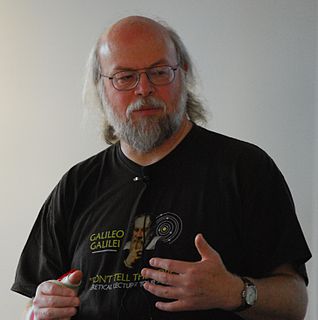A Quote by Kevin Mitnick
What happens with smaller businesses is that they give in to the misconception that their site is secure because the system administrator deployed standard security products - firewalls, intrusion detection systems, or stronger authentication devices such as time-based tokens or biometric smart cards. But those things can be exploited.
Related Quotes
A company can spend hundreds of thousands of dollars on firewalls, intrusion detection systems and encryption and other security technologies, but if an attacker can call one trusted person within the company, and that person complies, and if the attacker gets in, then all that money spent on technology is essentially wasted.
We will finally complete the biometric entry-exit visa tracking system, which we need desperately. For years Congress has required biometric entry-exit visa tracking systems but it has never been completed. The politicians are all talk, no action. Never happens, never happens... In my administration we will ensure that this system is in place.
Something we have to remember is that everything about the internet is interconnected. All of our systems are not just common to us because of the network links between them, but because of the software packages, because of the hardware devices that comprise it. The same router that's deployed in the United States is deployed in China.
In the digital world, content has the tendency to lose value, especially on smart devices. We finally found solutions to the problem. We will not merely port games developed for our dedicated systems to smart devices just as they are - we will develop brand new software which perfectly matches the play style and control mechanisms of smart devices.
In the Java world, security is not viewed as an add-on a feature. It is a pervasive way of thinking. Those who forget to think in a secure mindset end up in trouble. But just because the facilities are there doesn't mean that security is assured automatically. A set of standard practices has evolved over the years. The Secure Coding Standard for Java is a compendium of these practices. These are not theoretical research papers or product marketing blurbs. This is all serious, mission-critical, battle-tested, enterprise-scale stuff.
Artificial intelligence is based on the assumption that the mind can be described as some kind of formal system manipulating symbols that stand for things in the world. Thus it doesn't matter what the brain is made of, or what it uses for tokens in the great game of thinking. Using an equivalent set of tokens and rules, we can do thinking with a digital computer, just as we can play chess using cups, salt and pepper shakers, knives, forks, and spoons. Using the right software, one system (the mind) can be mapped onto the other (the computer).
We are focused on features, not products. We eliminated future products that would have made the complexity problem worse. We don't want to have 20 different products that work in 20 different ways. I was getting lost at our site keeping track of everything. I would rather have a smaller set of products that have a shared set of features.





























